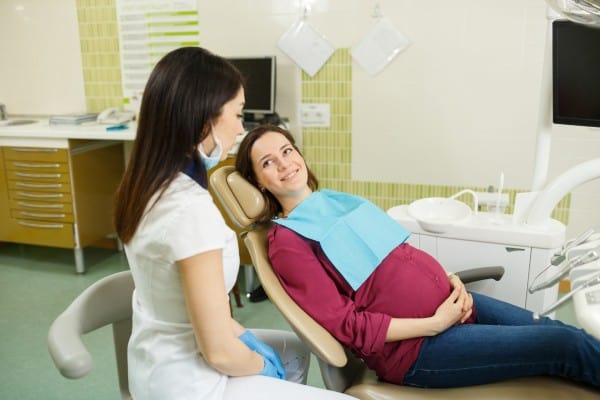When you discover that you’re pregnant, there are so many things on the “to-do” list. Shopping for baby related products, doctors appointments and ultrasounds, sourcing new clothes to fit your growing belly, making maternity leave or work arrangements, financial planning and even considering how parenthood will affect your relationship with your partner can feel all consuming. Dental health is not usually high on the priority list for most pregnant women, but actually, it’s pretty important.
HOW DOES PREGNANCY AFFECT YOUR TEETH?
The hormone changes that come with pregnancy can cause inflammation of the gums (often experienced as bleeding or inflamed gums). Pregnancy gingivitis (gum disease) has been shown across several studies to affect between 30-100% of pregnant women, often beginning in the second month of the pregnancy and increasing from there. Advanced gum disease during pregnancy can sometimes result in loose teeth, but more importantly, it has also been linked to low birth weights and premature births.

Some movement in the teeth can also be attributed during pregnancy due to the presence of the hormone Relaxin. This hormone is designed to help loosen and relax the ligaments that to aid with the bodily changes that are required while carrying a baby and eventually childbirt. Unfortunately, it can also loosen other ligaments (often resulting in hip and back pain through hypermobility) and also allow the teeth to shift slightly as the ligaments that help the teeth bind to the jaw and gums soften. This isn’t generally anything to be worried about, but if you’re in the midst of orthodontic treatment such as braces, it’s probably worth letting your orthodontist know about your pregnancy as soon as possible.
The incidence of tooth decay can increase during pregnancy for a few reasons:
– Hormone changes increase mouth acidity (which isn’t great for your tooth enamel);
– Nausea and vomiting incidentally exposes teeth to the acidic contents of their last meal on a repeated basis;
– Cravings for certain foods might mean a higher levelof sugar intake;
– Frequent eating or grazing all day can be useful for suppressing nausea or for some women (particularly those carrying a multiple pregnancy) they may have a reduced stomach capacity, but increased appetite. Constantly eating means your mouth keep producing acid to start the digestion process.
– For some women, their gag reflex increases during pregnancy, which can make using a toothbrush uncomfortable and efficiency of brushing and flossing might be reduced.
WHAT CAN BE DONE TO PROTECT YOUR TEETH DURING PREGNANCY?
A good diet, regular and effective oral hygiene and a professional clean with your dentist are the best things you can do for your teeth during pregnancy. If nausea or constant hunger results in you needing to eat more regularly throughout the day, try to make good choices as far as nutrition goes and rinse your mouth out after eating to help remove food particles that may stick to your teeth. Brushing twice a day and flossing is recommended all the time in order to look after your oral health, but is especially important during pregnancy.
YOUR PREGNANCY CAN AFFECT THE TEETH OF YOUR UNBORN BABY.
A large amount of enamel quality is influenced by the health of the child (or the mother), while in utero. Milk teeth (also known as baby teeth) develop between the sixth and eighth week of a pregnancy, when many women don’t even realise they’re pregnant yet. The hardening of the enamel is completed by the around Week 20 of gestation, which means that nutritional deficiencies or illness (especially one that requires antibiotics) during certain stages of the pregnancy can affect the enamel quality that forms as a result.
Nutrition is so important both pre-conception and during pregnancy. For proper tooth formation, women need to be getting enough calories, protein and numerous vitamins such as A, C and D as well as important minerals such as calcium and phosphate.
It’s during the third trimester of pregnancy when the unborn baby accumulates their overall stores of calcium, phosphate and Vitamin D. Premature babies can miss out on some of these goodies and so this may be worth discussing with your health professional after the birth to see if supplementation is appropriate. Full term babies are reliant on their mothers’ nutritional intake during this important phase of pregnancy. Once milk teeth have emerged, products such as tooth mousse may be suitable for assisting in remineralising the teeth, but it’s worth chatting to a paediatric dentist about appropriate options.
WHEN SHOULD YOU VISIT THE DENTIST DURING PREGNANCY?
Routine dental treatments can be performed safely pregnancy, but it’s best to inform your dentist as a matter of precaution. Lying on your back for extended periods is not recommended during the latter stages of pregnancy as the pressure may restrict blood flow to the baby. If you’ve left your run a bit late to get that dental appointment sorted, you can discuss how your dentist can position you in order to minimise risk..
If you don’t manage to get to the dentist during your pregnancy, book an appointment for after your baby is born for a routine check up to make sure everything is in order.





